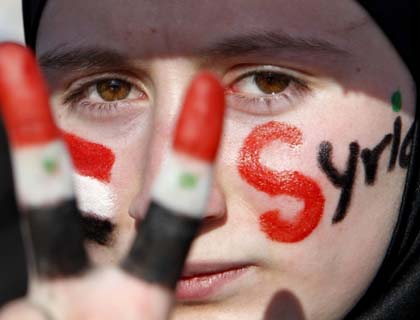The announcement of UN secretary general Ban Ki-moon about the horrible number of death toll of Syria once again revealed the ineffectiveness of policies by regional and global power to end the war. He termed the number of death as horrible but meanwhile emphasized that there would be no surprise if it doubled as more combatants and weapons are pouring into the country. He also expressed his disappointment over any promising prospect of the war saying that measures which would have halted the war were not practical anymore.
Indeed, his frustration showed that the United Nations sees no optimistic sign to stop further carnage in the country. Perhaps, it was possible to do something if all countries gathered behind any measure suggested by organization but unfortunately the Syrian crisis has diverted to new direction. Presently, it does not seem gross if the Syrian chaos be branded as proxy war of regional countries. It was possible that we would hope for stoppage of the carnage if foreign interference was stopped. Presently, there are four scenarios in the country.
First: the radical supporters of President Assad who are of view that government is in a stronger position and the continuance of war might finally end up to complete obliteration of rebellions. They are trying their best to motivate President Assad to keep tighter fist on power and never compromise with his oppositions. Indeed, this front has been further strengthened with recapture of al-Qasir strategic city by
Syrian security forces along with visible support from Hezbollah militia and possibly Iranian devotees. With the recent military advancement in Aleppo, it is highly possible that this front further becomes committed to their policy. Early this week, the UK based popular news agency, daily Telegraph openly released an article about the possibility of victory of President in the current civil war.
Indeed, this wing from the very start of insurgency has tried to show that rebellions have no ground support rather the stooges of foreign countries who are plotting to oust Assad regime. By branding rebellions as terrorist, they also tried to weaken their status at national and global levels. However, it is not clear how much such label proved effective in weakening of armed opposition status but the process proved in their benefit because by the course of time, Jihadist poured from around the world in the country and fought a holy war against the regime. So, the groups established by individuals openly announced their linkage with global Jihadi objectives and even al-Qaeda networks. Some western countries who provide huge diplomatic dividend to rebellions and harshly stood against Assad regime, anticipating a doomed destiny, finally started hesitating about provision of lethal aid. No doubt, many have committed to provide arms, including the United States whose involvement were deemed to accelerate the collapse of the regime, but till now have acted too cautiously.
The western politicians and security officials fear that those lethal aids may finally end up to hands of terrorist groups and after oust of Assad they will turn back towards the chest of the United States as happened in Afghanistan. Such security discretion have caused the western countries who completely were willing to see the fall of Assad through empowerment of rebellions to put on hold the strategy of arming oppositions. The procedure has further retarded as part some of the suicide bombings appeared to be much similar to that of al-Qaeda.
On the other hand, the radical supporters of the regime are exploiting the overruling environment through political and military support. Perhaps, the victory of Syrian security forces that they have learned new tactics to fight a domestic war that also with support of countries like Iran. So, at least, it can be claimed that if Syrian oppositions lose the diplomatic and military support of countries that were seeing their interest in the fall of Assad, then this front will be highly strengthened.
Second scenario which is also supported by Assad supporter is this that the regime should remain strong enough to stand against insurgents but with difference that they, unlike the first group, support a diplomatic approach too. According to this scenario the collapse of the government will lead to uncontrollable consequences for the region and for the world. The main objective of this category is not elimination of oppositions rather they deem them as power that should be negotiated with. But negotiation should be made on regime terms and conditions. In other words, they have lost hope for complete crackdown of uprising due to span and depth of civilians’ dissent from the government.
The collapse of the regime means losing a close ally in the region and loss to their global and regional rivals. Russia spearheads this front albeit with cooperation of the first category. From the very start of uprising and growing support for rebellions, Russia and China have stood against the motion. They do not want to see that model of Libya be applied in Syria too.
So, according to them the regime of President Assad should not collapse rather it should be kept but should negotiate with oppositions. Meanwhile negotiations should not compromise the regime’s power rather President should remain in power till the end of his presidential incumbency. And he should facilitate and pave the way for a peaceful transition. This on one hand will prevent the certain wreck of havoc which may be released after the collapse of the central power; on other hand comparatively cheaper way to the crisis.
To be continued…

